- Home
- Cassandra Clare
The Bane Chronicles Page 9
The Bane Chronicles Read online
Page 9
An extremely awkward pause ensued. Starkweather glared around, and his eyes dwelled on Camille, not as if she were a beautiful woman but as if she might be a fine trophy for his wall. Camille’s eyes went to her leader and friend, the pale-haired vampire Alexei de Quincey, but he did not respond to her mute appeal. Magnus put out his hand and took hers.
Her skin was cool, but her fingers fit his very neatly. He saw Ralf Scott glance over at them and blanch. He was even younger than Magnus had thought. His eyes were huge and glass green, transparent enough for all his emotions to shine through, in his thin face. They were fixed on Camille.
Interesting, Magnus thought, and filed the observation away.
“These are meant to be peace accords,” Scott said, deliberately slowly. “Which means we are all meant to have a chance to have our voices heard. I have heard how peace will benefit Shadowhunters. I wish now to discuss how it will benefit Downworlders. Will we be given seats on the Council?”
Starkweather began to choke. One of the Shadowhunter women stood up hastily. “Gracious, I think my husband was so excited by the chance to deliver a speech that he did not offer refreshments,” she said loudly. “I am Amalia Morgenstern.” Oh, that’s it, Magnus thought. Morgenstern. Awful name. “And is there anything I can offer you?” the woman continued. “I will ring for the maid in a trice.”
“No raw meat for the dog, mind,” Starkweather said, and sniggered. Magnus saw another Shadowhunter woman titter silently behind her hand. Ralf Scott sat, pale and still. He had been the moving force behind assembling Downworlders here today, and had been the only werewolf willing to come. Even his own young brother, Woolsey, had stayed away, parting from Ralf on the front steps of the Institute with an insouciant toss of his blond head and a wink at Magnus. (Magnus had thought, Interesting, about that, too.)
The faeries had flatly refused to attend, the queen having set herself against the idea. Magnus was the only warlock who had come, and Ralf had been forced to hunt him down, knowing his connections to the Silent Brothers. Magnus himself had not had high hopes about this attempt to forge a peace with Shadowhunters, but it was a shame to see the boy’s airy dreams come to this.
“We are in England, are we not?” asked Magnus, and he bent a charming smile on Amalia Morgenstern, who looked rather flustered. “I would be delighted if we could have some scones.”
“Oh, certainly,” said Amalia. “With clotted cream, of course.”
Magnus gazed upon Camille. “Some of my fondest memories include lashings of cream and beautiful women.”
Magnus was enjoying scandalizing the Shadowhunters. Camille rather looked as if she were enjoying it too. Her green eyes were heavy-lidded for a moment with amused satisfaction, as if she were a cat who had already had her fill of cream.
Amalia rang the bell. “While we wait for scones, we can hear the rest of dear Roderick’s speech!”
There was an appalled silence, and in the stillness the mutter outside the door rang out, loud and clear.
“Merciful Angel, give me strength to endure. . . .”
Roderick Morgenstern, who Magnus thought truly deserved to have a name that sounded like a goat chewing gravel, stood up happily to continue his speech. Amalia attempted to rise unobtrusively from her seat—Magnus could have told her that hoop skirts and stealth together were a lost cause—and made her way to the door, which she threw open.
Several young Shadowhunters tumbled into the room like puppies falling over one another. Amalia’s eyes rounded in comic surprise. “What on earth—”
Despite Shadowhunters having the swiftness of angels, only one managed to land with grace. It was a boy, or rather a young man, who ended his fall on one knee before Amalia, like Romeo proposing to Juliet.
He had hair the color of a coin that was pure gold, no base metal, and the lines of his face were as clean and elegant as a profile etched on one of those princely coins. His shirt had become disarranged at some point during the eavesdropping, the collar pulled open to reveal the edge of a rune drawn on his white skin.
The most remarkable thing about him were his eyes. They were laughing eyes, at once both joyous and tender: they were the radiant pale blue of a sky slipping toward evening in Heaven, when angels who had been sweet all day found themselves tempted to sin.
“I could not bear to be parted from you a moment longer, dear, dearest Mrs. Morgenstern,” said the young man, possessing himself of Amalia’s hand. “I yearn for you.”
He made play with his long golden eyelashes, and Amalia Morgenstern was forthwith reduced to blushes and smiles.
Magnus had always had a decided preference for black hair. It appeared as though fate were determined that he should broaden his horizons. Either that or the blonds of the world had formed some sort of conspiracy to be good-looking all of a sudden.
“Excuse me, Bane?” said Roderick Morgenstern. “Are you attending?”
“I’m so sorry,” Magnus said politely. “Somebody incredibly attractive just came into the room, and I ceased to pay attention to a word you were saying.”
It was perhaps an ill-judged remark. The Shadowhunter elders, representatives from the Clave, all appeared horrified and dismayed at any Downworlder expressing interest in one of their youths. The Nephilim also had very decided opinions on the subject of inverts and deviant behavior, since as a group their chief occupations were waving large weaponry about and judging everybody they met.
Camille, meanwhile, looked as if she found Magnus even more interesting than she had before. She looked back and forth between him and the young blond Shadowhunter boy, and covered her smile with a gloved hand.
“He is delightful,” she murmured to Magnus.
Magnus was watching as Amalia shooed out the young Shadowhunters—the blond boy; an older young man with thick brown hair and significant eyebrows; and a dark-eyed, birdlike little girl, barely more than a toddler, who looked over her shoulder and said, “Papa?” in a clear questioning voice to the head of the London Institute, a grave dark man called Granville Fairchild.
“Go, Charlotte. You know your duty,” said Fairchild. Duty before all; that was the warrior’s way, Magnus reflected. Certainly duty before love.
Little Charlotte, already a dutiful Shadowhunter, trotted obediently away.
Camille’s low voice recalled Magnus to attention. “I don’t suppose you’d like to share him?”
Magnus smiled back at her. “Not as a meal, no. Was that what you meant?”
Camille laughed. Ralf Scott made an impatient noise, but was shushed by de Quincey, who muttered at him in annoyance; while over that noise rose the discontented grumblings of Roderick Morgenstern, a man who clearly wished to continue with his speech—and then finally the refreshments arrived, carried in on silver tea trays by a host of maids.
Arabella the mermaid lifted a hand, sloshing energetically in her aquarium.
“If you please,” she said. “I would like a scone.”
When Morgenstern’s interminable speech was finally done, everybody had lost all will to converse and simply wished to go home. Magnus parted from Camille Belcourt with deep reluctance and from the Shadowhunters with deep relief.
It had been some time since Magnus was last in love, and he was beginning to feel the effects. He remembered the glow of love as brighter and the pain of loss as gentler than they had actually been. He found himself looking into many faces for potential love, and seeing many people as shining vessels of possibility. Perhaps this time there would be that indefinable something that sent hungry hearts roving, longing and searching for something, they knew not what, and yet could not give up the quest. Every time a face or a look or a gesture caught Magnus’s eye these days, it woke to life a refrain in Magnus’s breast, a song in persistent rhythm with his heartbeat. Perhaps this time, perhaps this one.
As he walked down Thames Street, he began to plot ways
in which to see Camille again. He should pay a call upon the vampire clan in London. He knew de Quincey lived in Kensington.
It was only civil.
“After all,” Magnus remarked aloud to himself, swinging his monkey-headed cane, “attractive and interesting persons do not simply drop out of the sky.”
It was then that the fair-haired Shadowhunter that Magnus had spotted at the Institute somersaulted from the top of a wall and landed gracefully in the street before him.
“Devastating ensembles made on Bond Street with red brocade waistcoats do not simply drop out of the sky!” Magnus proclaimed experimentally to the Heavens.
The young man frowned. “I beg your pardon?”
“Oh, nothing, nothing at all,” said Magnus. “May I help you? I do not believe I have had the pleasure of making your acquaintance.”
The Nephilim stooped and picked up his hat, which had fallen onto the cobblestones when he’d made his leap. He then took it off in order to flourish it in Magnus’s direction. The effect of the smile and the eyelashes together was like a small earthquake of attractiveness. Magnus could not blame Amalia Morgenstern for her giggling, even if the boy was far too young for her.
“No fewer than four of my esteemed elders told me I was on no account to ever converse with you, so I vowed that I would know you. My name is Edmund Herondale. May I ask your name? They referred to you only as ‘that disgraceful one-warlock show.’”
“I am deeply moved by that tribute,” Magnus told Edmund, and made his own bow. “Magnus Bane, at your service.”
“Now we are acquainted,” Edmund said. “Capital! Do you frequent any low dens of sin and debauchery?”
“Oh, now and then.”
“The Morgensterns said you did, while they were throwing away the plates,” Edmund said, with every sign of enthusiasm. “Shall we go?”
Throwing away the plates? It took Magnus a moment to comprehend, and when he did, he felt cold inside. The Shadowhunters had thrown away the very plates Downworlders had touched, afraid their china would be corrupted.
On the other hand, that was not Edmund’s fault. The only other place Magnus had to go was the mansion he had perhaps rashly purchased in Grosvenor Square. A recent adventure had caused him to become temporarily wealthy (a state he despised; he usually tried to get rid of his money as soon as he had it), so he had decided to live in style. The ton of London were referring to him, he believed, as “Bane the nabob.” This meant a great many people in London were anxious to make his acquaintance, and a great many of them seemed tiresome. Edmund, at least, did not.
“Why not?” Magnus decided.
Edmund glowed. “Excellent. Very few people are willing to have real adventures. Haven’t you found that out, Bane? Isn’t it sad?”
“I have very few rules in life, but one of them is to never decline an adventure. The others are: to avoid becoming romantically entangled with sea creatures; to always ask for what you want, because the worst thing that can happen is embarrassment but the best thing that can happen is nudity; to demand ready money up front; and to never play cards with Catarina Loss.”
“What?”
“She cheats,” Magnus explained. “Never mind that one.”
“I would like to meet a lady who cheats at cards,” Edmund said wistfully. “Aside from Granville’s aunt Millicent, who is a terror at piquet.”
Magnus had never truly considered that the high-and-mighty Shadowhunters ever played cards, let alone cheated at them. He supposed he had imagined that their leisure activities consisted of weapons training and having discussions about their infinite superiority over everyone else.
Magnus ventured to give Edmund a hint. “Mundane clubs do generally frown upon patrons who have, purely for random example, an abundance of weaponry about their person. So that might be an impediment.”
“Absolutely not,” Edmund promised him. “Why, I have the most paltry assortment of weapons on me. Only a few miserable daggers, a single stiletto knife, a couple of whips—”
Magnus blinked. “Hardly an armory,” he said. “Though, it sounds like a most amusing Saturday.”
“Capital!” said Edmund Herondale, apparently taking this for approval of his company on Magnus’s excursion. He looked delighted.
White’s club, on St. James’s Street, had not changed outwardly at all. Magnus regarded the pale stone facade with pleasure: the Greek columns and the arched frames to the higher windows, as if each window were a chapel unto itself; the cast-iron balcony, which bore an intricate swirling pattern that had always made Magnus think of a procession of snail shells; the bow window out of which a famous man had once looked, and bet on a race between raindrops. The club had been established by an Italian, had been the haunt of criminals, and had been the irresistible bane of English aristocrats for more than a hundred years.
Whenever Magnus heard anything described as a “bane,” he felt sure he would like it. It was why he had chosen that particular last name for himself, and also why he had joined White’s several years before on a flying visit to London, in the main because his friend Catarina Loss had bet him that he could not do it.
Edmund swung around one of the black cast-iron lamps set before the door. The leaping flame behind the glass was dim compared to his eyes.
“This used to be a place where highwaymen drank hot chocolate,” Magnus told Edmund carelessly as they walked inside. “The hot chocolate was very good. Being a highwayman is chilly work.”
“Did you ever ask someone to stand and deliver?”
“I’ll just say this,” said Magnus. “I look dashing in a tasteful mask and a large hat.”
Edmund laughed again—he had an easy and delighted laugh, like a child. His gaze was roving all over the room, from the ceiling—constructed to look as if they stood in a vast stone barrel—to the chandelier dripping glittering jewels like a duchess; to the green baize-covered tables that clustered on the right side of the room, where men were playing cards and losing fortunes.
Edmund’s quality of bright wonder and surprise made him seem younger than he was; it lent a fragile air to his beauty. Magnus did not wonder why he, one of the Nephilim, was not warier of a Downworlder. He doubted Edmund Herondale was wary of anything in life. He was eager to be entertained, ready to be thrilled, essentially trusting of the world.
Edmund pointed to where two men stood, one making an entry in a large book with a defiant flourish of his pen.
“What’s afoot there?”
“I presume they are recording a wager. There is a betting book here in White’s that is quite celebrated. All sorts of bets are taken—whether a gentleman could manage to ravish a lady in a balloon a thousand feet off the ground, whether a man could live underwater for a day.”
Magnus found them a pair of chairs near a fire, and made a gesture indicating that he and his companion were sorely in need of a drink. Their thirst was supplied the next instant. There were advantages to a truly excellent gentlemen’s club.
“Do you think one could?” Edmund inquired. “Not live underwater; I know mundanes cannot. The other thing.”
“My experiences in a balloon with a lady were not very pleasant,” Magnus said, wincing at the memory. Queen Marie Antoinette had been an exciting but not comfortable traveling companion. “I would be disinclined to indulge in carnal delights in a balloon with a lady or a gentleman. No matter how delightful they were.”
Edmund Herondale did not seem in the least surprised by the mention of a gentleman in Magnus’s romantic speculations.
“It would be a lady in the balloon for me,” he said.
“Ah,” said Magnus, who had suspected as much.
“But I am always flattered to be admired,” said Edmund, with an engaging grin. “And I am always admired.”
He said it with that easy smile and another golden flutter of eyelashes, in the same w
ay he had wound Amalia Morgenstern around his finger. It was clear he knew he was outrageous, and he expected people to like it. Magnus suspected they all did.
“Ah, well,” Magnus said, giving up the matter gracefully. “Any particular lady?”
“I am not perfectly certain I believe in marriage. Why have just one bonbon when you can have the box?”
Magnus raised his eyebrows and took a swallow of his excellent brandy. The young man had a way with words and the naïve delight of someone who had never had his heart broken.
“No one’s ever really hurt you, have they?” said Magnus, who saw no point in beating about the bush.
Edmund looked alarmed. “Why, are you about to?”
“With all those whips on your person? Hardly. I merely meant that you seem like someone who has never had his heart broken.”
“I lost my parents as a child,” said Edmund candidly. “But rare is the Shadowhunter with an intact family. I was taken in by the Fairchilds and raised in the Institute. Its halls have ever been my home. And if you mean love, then no, my heart has never been broken. Nor do I foresee that it will be.”
“Don’t you believe in love?”
“Love, marriage, the whole business is extremely overrated. For instance, this chap I know called Benedict Lightwood recently got leg-shackled, and the affair is hideous—”
“Your friends moving forward into a different era of their lives can be difficult,” Magnus said sympathetically.
Edmund made a face. “Benedict is not my friend. It’s the poor young lady I feel sorry for. The man is peculiar in his habits, if you see what I’m trying to say.”
“I don’t,” Magnus said flatly.
“Bit of a deviant, is what I’m getting at.”
Magnus regarded him with a cold air.
“Bad News Benedict, we call him,” said Edmund. “Mostly due to his habit of consorting with demons. The more tentacles, the better, if you catch my meaning.”

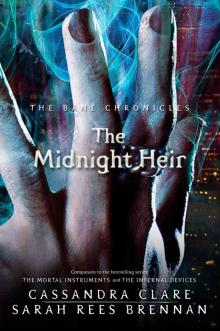 The Midnight Heir
The Midnight Heir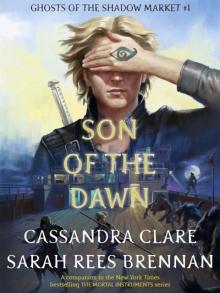 Son of the Dawn
Son of the Dawn Angels Twice Descending
Angels Twice Descending City of Bones
City of Bones Vampires, Scones, and Edmund Herondale
Vampires, Scones, and Edmund Herondale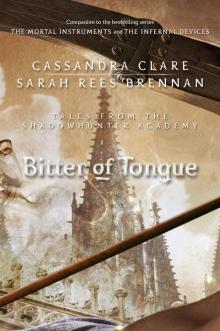 Bitter of Tongue
Bitter of Tongue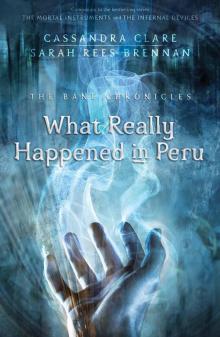 What Really Happened in Peru
What Really Happened in Peru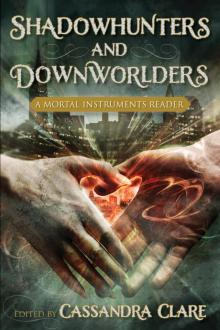 Shadowhunters and Downworlders
Shadowhunters and Downworlders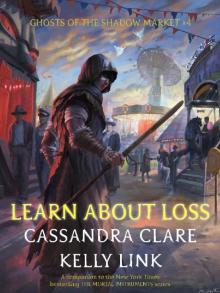 Learn About Loss
Learn About Loss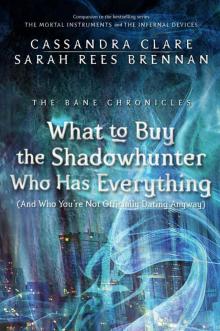 What to Buy the Shadowhunter Who Has Everything
What to Buy the Shadowhunter Who Has Everything Welcome to Shadowhunter Academy
Welcome to Shadowhunter Academy Nothing but Shadows
Nothing but Shadows Clockwork Prince
Clockwork Prince The Fiery Trial
The Fiery Trial City of Glass
City of Glass Clockwork Angel
Clockwork Angel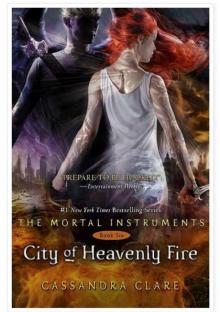 City of Heavenly Fire
City of Heavenly Fire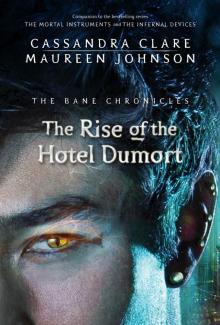 The Rise of the Hotel Dumort
The Rise of the Hotel Dumort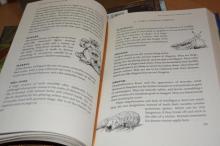 The Shadowhunters Codex
The Shadowhunters Codex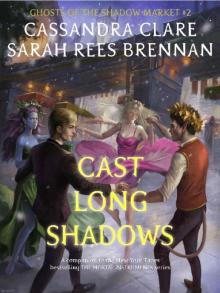 Cast Long Shadows
Cast Long Shadows City of Lost Souls
City of Lost Souls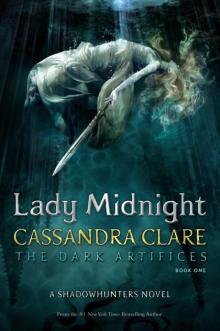 Lady Midnight
Lady Midnight Lord of Shadows
Lord of Shadows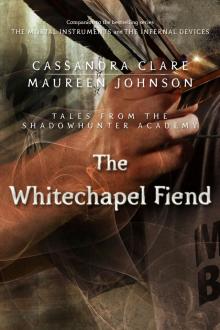 The Whitechapel Fiend
The Whitechapel Fiend City of Fallen Angels
City of Fallen Angels Clockwork Princess
Clockwork Princess Queen of Air and Darkness
Queen of Air and Darkness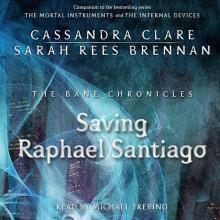 Saving Raphael Santiago
Saving Raphael Santiago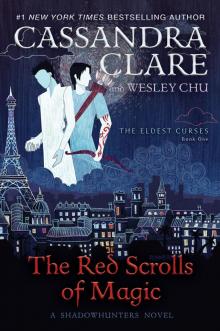 The Red Scrolls of Magic
The Red Scrolls of Magic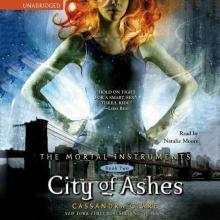 City of Ashes
City of Ashes Pale Kings and Princes
Pale Kings and Princes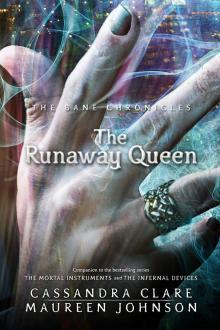 The Runaway Queen
The Runaway Queen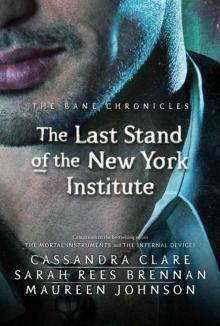 The Last Stand of the New York Institute
The Last Stand of the New York Institute A Long Conversation (The Shadowhunter Chronicles)
A Long Conversation (The Shadowhunter Chronicles) The Lost Book of the White
The Lost Book of the White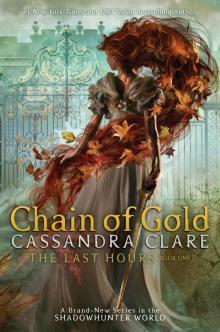 Chain of Gold
Chain of Gold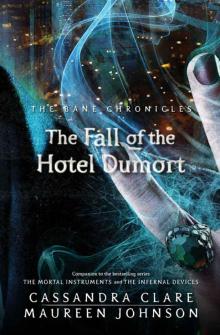 The Fall of the Hotel Dumort
The Fall of the Hotel Dumort Born to Endless Night
Born to Endless Night The Lost Herondale
The Lost Herondale An Illustrated History of Notable Shadowhunters & Denizens of Downworld
An Illustrated History of Notable Shadowhunters & Denizens of Downworld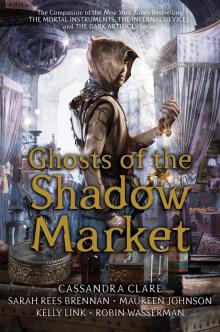 Ghosts of the Shadow Market
Ghosts of the Shadow Market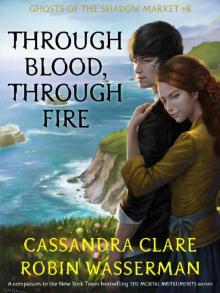 Through Blood, Through Fire
Through Blood, Through Fire Every Exquisite Thing
Every Exquisite Thing City of Fallen Angels mi-4
City of Fallen Angels mi-4 The Land I Lost (Ghosts of the Shadow Market Book 7)
The Land I Lost (Ghosts of the Shadow Market Book 7) Queen of Air and Darkness (The Dark Artifices #3)
Queen of Air and Darkness (The Dark Artifices #3)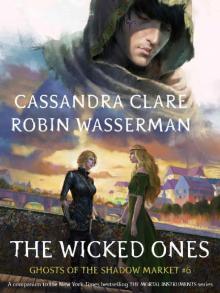 The Wicked Ones (Ghosts of the Shadow Market Book 6)
The Wicked Ones (Ghosts of the Shadow Market Book 6) The Wicked Ones
The Wicked Ones A Deeper Love
A Deeper Love City of Fallen Angels (4)
City of Fallen Angels (4)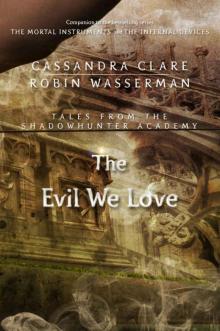 The Evil We Love (Tales from the Shadowhunter Academy Book 5)
The Evil We Love (Tales from the Shadowhunter Academy Book 5) Vampires, Scones, and Edmund Herondale tbc-3
Vampires, Scones, and Edmund Herondale tbc-3 City of Glass mi-3
City of Glass mi-3 Tales from the Shadowhunter Academy
Tales from the Shadowhunter Academy The Infernal Devices Series
The Infernal Devices Series City of Ashes mi-2
City of Ashes mi-2 Cassandra Clare: The Mortal Instruments Series
Cassandra Clare: The Mortal Instruments Series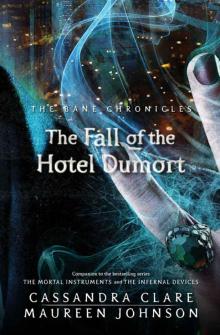 The Bane Chronicles 7: The Fall of the Hotel Dumort
The Bane Chronicles 7: The Fall of the Hotel Dumort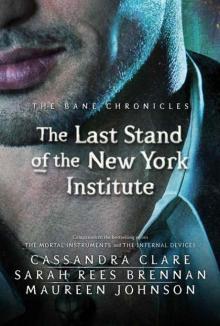 The Last Stand of the New York Institute (The Bane Chronicles)
The Last Stand of the New York Institute (The Bane Chronicles) The Land I Lost
The Land I Lost![Saving Raphael Santiago - [Bane Chronicles 06] Read online](http://i1.bookreadfree.com/i1/04/03/saving_raphael_santiago_-_bane_chronicles_06_preview.jpg) Saving Raphael Santiago - [Bane Chronicles 06]
Saving Raphael Santiago - [Bane Chronicles 06] Clockwork Angel tid-1
Clockwork Angel tid-1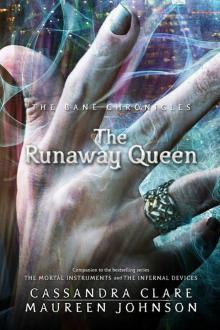 The Runaway Queen tbc-2
The Runaway Queen tbc-2 The Bane Chronicles
The Bane Chronicles City of Lost Souls mi-5
City of Lost Souls mi-5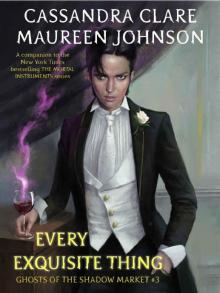 Every Exquisite Thing (Ghosts of the Shadow Market Book 3)
Every Exquisite Thing (Ghosts of the Shadow Market Book 3) Shadowhunter’s Codex
Shadowhunter’s Codex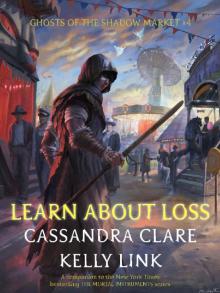 Learn About Loss (Ghosts of the Shadow Market Book 4)
Learn About Loss (Ghosts of the Shadow Market Book 4) Welcome to Shadowhunter Academy (Tales from the Shadowhunter Academy Book 1)
Welcome to Shadowhunter Academy (Tales from the Shadowhunter Academy Book 1)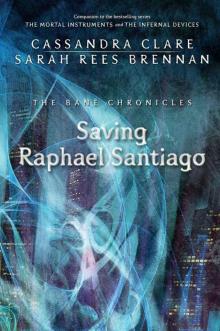 Saving Raphael Santiago tbc-6
Saving Raphael Santiago tbc-6 City of Bones mi-1
City of Bones mi-1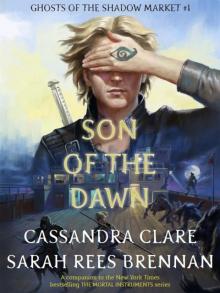 Ghosts of the Shadow Market Book 1_Son of the Dawn
Ghosts of the Shadow Market Book 1_Son of the Dawn Clockwork Princess (Infernal Devices, The)
Clockwork Princess (Infernal Devices, The) Clockwork Prince tid-2
Clockwork Prince tid-2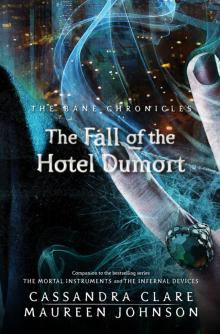 No Immortal Can Keep a Secret
No Immortal Can Keep a Secret A Deeper Love (Ghosts of the Shadow Market Book 5)
A Deeper Love (Ghosts of the Shadow Market Book 5) The Course of True Love (and First Dates)
The Course of True Love (and First Dates)